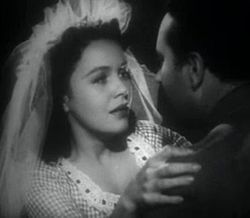This article needs additional citations for verification .(August 2014) |
| Cheers for Miss Bishop | |
|---|---|
 Scene from film | |
| Directed by | Tay Garnett |
| Screenplay by | Sheridan Gibney Adelaide Heilbron Stephen Vincent Benét (screen adaptation) |
| Based on | Miss Bishop 1933 novel by Bess Streeter Aldrich |
| Produced by | Richard A. Rowland |
| Starring | Martha Scott William Gargan Edmund Gwenn |
| Cinematography | Hal Mohr |
| Edited by | William F. Claxton |
| Music by | Edward Ward |
| Color process | Black and white |
Production company | Richard A. Rowland Productions |
| Distributed by | United Artists |
Release date |
|
Running time | 95 minutes |
| Country | United States |
| Language | English |
| Budget | $650,000 [1] |
Cheers for Miss Bishop is a 1941 American drama film based on the novel Miss Bishop by Bess Streeter Aldrich. It was directed by Tay Garnett, produced by Richard A. Rowland and released through United Artists. Martha Scott stars in the title role, and the other cast members include William Gargan, Edmund Gwenn, Sterling Holloway, Dorothy Peterson, Marsha Hunt, Don Douglas and Sidney Blackmer.